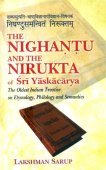Kautsa: 13 definitions
Introduction:
Kautsa means something in Hinduism, Sanskrit. If you want to know the exact meaning, history, etymology or English translation of this term then check out the descriptions on this page. Add your comment or reference to a book if you want to contribute to this summary article.
In Hinduism
Natyashastra (theatrics and dramaturgy)
Source: Wisdom Library: Nāṭya-śāstraKautsa (कौत्स) is the Sanskrit name of one of Bharata’s sons, mentioned in the Nāṭyaśāstra 1.26-33. After Brahmā created the Nāṭyaveda (nāṭyaśāstra), he ordered Bharata to teach the science to his (one hundred) sons. Bharata thus learned the Nāṭyaveda from Brahmā, and then made his sons study and learn its proper application. After their study, Bharata assigned his sons (eg., Kautsa) various roles suitable to them.

Natyashastra (नाट्यशास्त्र, nāṭyaśāstra) refers to both the ancient Indian tradition (shastra) of performing arts, (natya—theatrics, drama, dance, music), as well as the name of a Sanskrit work dealing with these subjects. It also teaches the rules for composing Dramatic plays (nataka), construction and performance of Theater, and Poetic works (kavya).
Purana and Itihasa (epic history)
Source: archive.org: Puranic EncyclopediaKautsa (कौत्स).—A noble Brahmin scholar. He was present at the sarpa-sattra (sacrificial fire to kill serpents) of Janamejaya. (Mahābhārata Ādi Parva, Chapter 53, Stanza 6).
Source: archive.org: Shiva Purana - English TranslationKautsa (कौत्स) is the name of an ancient Sage (Muni), according to the Śivapurāṇa 2.3.39 (“The gods arrive at Kailāsa”).—Accordingly: “[...] Lord Śiva thus requested by Viṣṇu, and being himself eager to follow worldly conventions performed the same duly. Authorised by Him, I performed all the rites conducive to prosperity, assisted by the sages. The sages [e.g., Kautsa, ...], and other sages came to Śiva. Urged by me they performed the sacred rites duly. All of them who had mastered the Vedas and Vedāṅgas performed the safety rites for Śiva and tied the auspicious thread round his wrist. [...]”.
Source: Cologne Digital Sanskrit Dictionaries: The Purana Index1a) Kautsa (कौत्स).—A Tripravara sage.*
- * Matsya-purāṇa 196. 33-34.
1b) A Bhārgava gotrakara.*
- * Matsya-purāṇa 195. 25.
Kautsa (कौत्स) is a name mentioned in the Mahābhārata (cf. I.48.6, I.53) and represents one of the many proper names used for people and places. Note: The Mahābhārata (mentioning Kautsa) is a Sanskrit epic poem consisting of 100,000 ślokas (metrical verses) and is over 2000 years old.

The Purana (पुराण, purāṇas) refers to Sanskrit literature preserving ancient India’s vast cultural history, including historical legends, religious ceremonies, various arts and sciences. The eighteen mahapuranas total over 400,000 shlokas (metrical couplets) and date to at least several centuries BCE.
Languages of India and abroad
Sanskrit dictionary
Source: DDSA: The practical Sanskrit-English dictionaryKautsa (कौत्स).—A Sāman composed by Kutsa.
-tsaḥ 1 Name of a sage; माण्डव्यः कौत्सात् (māṇḍavyaḥ kautsāt) Bṛ. Up.6.5.4; उपसेदित्वात् कौत्सः पाणिनिम् (upaseditvāt kautsaḥ pāṇinim) Mahābhārata on P.III.2.18.
2) Name of a pupil of Varatantu; R.5.1.
3) Name of a degraded family.
Derivable forms: kautsam (कौत्सम्).
Source: Cologne Digital Sanskrit Dictionaries: Benfey Sanskrit-English DictionaryKautsa (कौत्स).—i. e. kutsa + a, 1. adj. Used by Kutsa, [Mānavadharmaśāstra] 11, 249. 2. patron. Mahābhārata 13, 6270.
Source: Cologne Digital Sanskrit Dictionaries: Cappeller Sanskrit-English DictionaryKautsa (कौत्स).—[adjective] Kutsa's; [masculine] a patr. name ([feminine] ī).
Source: Cologne Digital Sanskrit Dictionaries: Aufrecht Catalogus Catalogorum1) Kautsa (कौत्स) as mentioned in Aufrecht’s Catalogus Catalogorum:—Quoted by Yāska 1, 15, in Āśvalāyana Śrautasūtra 1, 2, 5. 7, 1, 19, in Āpastamba Dharmasūtra 1, 19, 4. 28, 1.
2) Kautsa (कौत्स):—Quoted in Lāṭyāyanaśrautasūtra 10, 2, 9.
3) Kautsa (कौत्स):—on dharma. Quoted by Hemādri in Pariśeṣakhaṇḍa 2, 251.
Source: Cologne Digital Sanskrit Dictionaries: Monier-Williams Sanskrit-English Dictionary1) Kautsa (कौत्स):—mfn. relating to Kutsa, [Ṛgveda-prātiśākhya]
2) m. [patronymic] of a teacher, [Śatapatha-brāhmaṇa x; Āśvalāyana-śrauta-sūtra; Nirukta, by Yāska] etc.
3) of Durmitra and Sumitra, [Ṛgveda-anukramaṇikā]
4) of a pupil of Vara-tantu, [Raghuvaṃśa v, 1]
5) of a son-in-law of Bhagī-ratha, [Mahābhārata xiii, 6270]
6) of Jaimini, [Mahābhārata i, 2046]
7) Name of a degraded family (See √kuts), [Kātyāyana-śrauta-sūtra]
8) n. Name of a Sūkta (composed by Kutsa), [Manu-smṛti xi, 249]
9) of different Sāmans, [Ārṣeya-brāhmaṇa; Lāṭyāyana]
Source: DDSA: Paia-sadda-mahannavo; a comprehensive Prakrit Hindi dictionary (S)Kautsa (कौत्स) in the Sanskrit language is related to the Prakrit word: Koccha.
[Sanskrit to German]
Sanskrit, also spelled संस्कृतम् (saṃskṛtam), is an ancient language of India commonly seen as the grandmother of the Indo-European language family (even English!). Closely allied with Prakrit and Pali, Sanskrit is more exhaustive in both grammar and terms and has the most extensive collection of literature in the world, greatly surpassing its sister-languages Greek and Latin.
See also (Relevant definitions)
Starts with: Kautsavyaniruktanighanta, Kautsayana.
Ends with: Aidakautsa, Kantakautsa.
Full-text: Koccha, Varatantu, Hamsi, Kautsya, Dashavaja, Aidakautsa, Kautsi, Kautsayana, Kautsiputra, Kvasu, Sumitra, Asita, Nirukta, Kutsa, Prapad, Svara.
Relevant text
Search found 20 books and stories containing Kautsa; (plurals include: Kautsas). You can also click to the full overview containing English textual excerpts. Below are direct links for the most relevant articles:
Rig Veda (translation and commentary) (by H. H. Wilson)
Manusmriti with the Commentary of Medhatithi (by Ganganatha Jha)
Verse 11.249 < [Section XXXII - Expiation of Secret Sins]
Verse 8.339 < [Section XLIV - Robbery (sāhasa)]
Atithi or Guest Reception (study) (by Sarika. P.)
Part 1 - References to Hospitality in the Raghuvaṃśa < [Chapter 4 - Atithi-saparyā in Classical Sanskrit Literature]
Part 2 - Atithi-saparyā in the Brāhmaṇas < [Chapter 2 - Ātithyeṣṭi]
Part 13 - References to Hospitality in Subhāṣita-Ratna-Bhāṇḍāgāra < [Chapter 4 - Atithi-saparyā in Classical Sanskrit Literature]
The Skanda Purana (by G. V. Tagare)
Chapter 5 - The Efficacy of Tilodakī < [Section 8 - Ayodhyā-māhātmya]
Chapter 4 - The Greatness of Dharmahari < [Section 8 - Ayodhyā-māhātmya]
Chapter 115 - Gotras of Sages < [Section 1 - Tīrtha-māhātmya]
Kuntaka’s evaluation of Sanskrit literature (by Nikitha. M)
3.8 (e): Contextual figurativeness or prakaraṇa-vakratā < [Chapter 1 - Vakroktijīvita: A Synoptic Survey]
3. Raghuvaṃśa in Kuntaka’s treatment < [Chapter 2 - Kuntaka’s appraisal of Kālidāsa]
Puranic encyclopaedia (by Vettam Mani)
Related products
